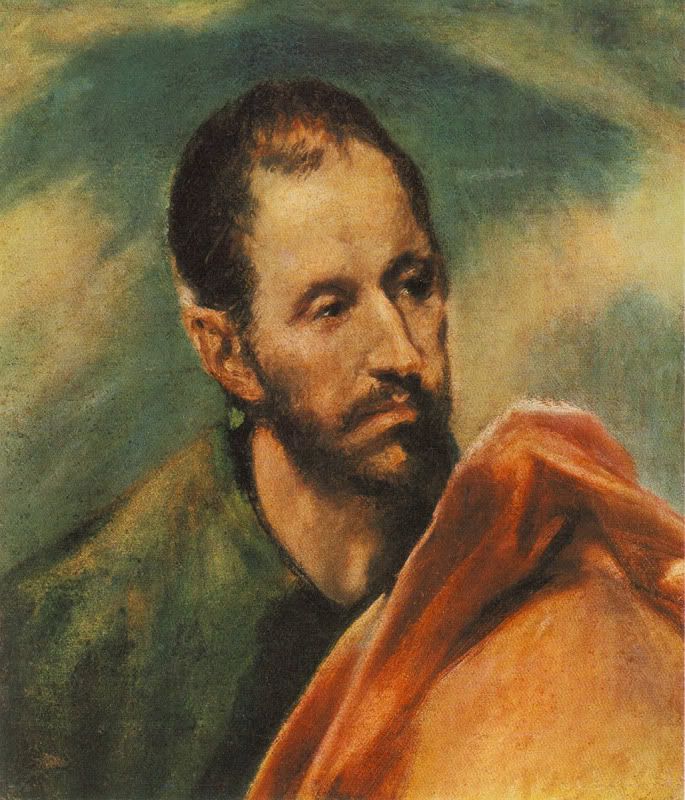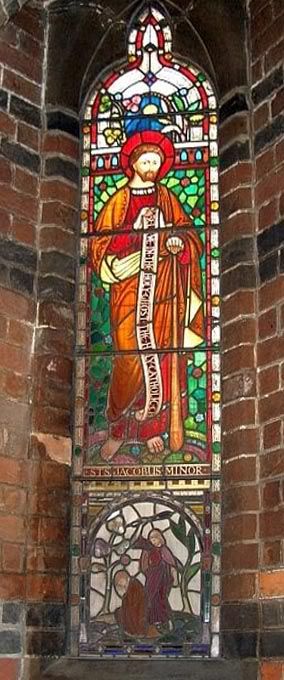Saint James the Lesser was called to discipleship in the second year of the ministry of Jesus. Upon the Ascension of the Lord, James was appointed Bishop of Jerusalem. During this time of great danger to the Church, Saint James’ virtues kept the persecution and anger of the citizens of Jerusalem at bay. Despite his faith, he came to be respected by them. Saint Jerome gave the following account concerning his sanctity: "He was always a virgin, and was a Nazarite, or one consecrated to God. In consequence of which he was never shaved, never cut his hair, never drank any wine or other strong liquor; moreover, he never used any bath, or oil to anoint his limbs, and never ate of any living creature except when of precept, as the paschal lamb: he never wore sandals, never used any other clothes than one single linen garment. He prostrated so much in prayer, that the skin of his knees and forehead was hardened like to camels' hoofs." Working under the direction of Saint Peter, the first pope, Saint James the Lesser toiled tirelessly within the community of Jerusalem, addressing the laws of Moses, and converting thousands of Jews to Christianity.
Saint James the Lesser penned the epistle to the universal Church—to those converted Jews throughout scattered throughout the known world at that time. In his epistle, James provides guidance and instruction in the holy life, restates the importance of the sacraments, and the necessity of both faith and good works.
2Consider it pure joy, my brothers, whenever you face trials of many kinds, 3because you know that the testing of your faith develops perseverance. 4Perseverance must finish its work so that you may be mature and complete, not lacking anything. 5If any of you lacks wisdom, he should ask God, who gives generously to all without finding fault, and it will be given to him. 6But when he asks, he must believe and not doubt, because he who doubts is like a wave of the sea, blown and tossed by the wind. 7That man should not think he will receive anything from the Lord; 8he is a double-minded man, unstable in all he does.
9The brother in humble circumstances ought to take pride in his high position. 10But the one who is rich should take pride in his low position, because he will pass away like a wild flower. 11For the sun rises with scorching heat and withers the plant; its blossom falls and its beauty is destroyed. In the same way, the rich man will fade away even while he goes about his business.
12Blessed is the man who perseveres under trial, because when he has stood the test, he will receive the crown of life that God has promised to those who love him.
 13When tempted, no one should say, "God is tempting me." For God cannot be tempted by evil, nor does he tempt anyone; 14but each one is tempted when, by his own evil desire, he is dragged away and enticed. 15Then, after desire has conceived, it gives birth to sin; and sin, when it is full-grown, gives birth to death.
13When tempted, no one should say, "God is tempting me." For God cannot be tempted by evil, nor does he tempt anyone; 14but each one is tempted when, by his own evil desire, he is dragged away and enticed. 15Then, after desire has conceived, it gives birth to sin; and sin, when it is full-grown, gives birth to death. 16Don't be deceived, my dear brothers. 17Every good and perfect gift is from above, coming down from the Father of the heavenly lights, who does not change like shifting shadows. 18He chose to give us birth through the word of truth, that we might be a kind of first fruits of all he created. (James 1: 2-18)
Out of fear and political retribution, Saint James was summoned before the Sanhedrim at some point following his writing of the epistle. During this hearing, he was accused of violating the law, and sentenced to death by stoning. Biblical scholars suggest that this sentencing had less to do with law violation (as Saint James had committed no crime) and more to do with the frustration of the Jews at the time in not being able to punish Saint Paul, who had escaped persecution by appealing directly to Caesar. Saint James was carried to the top of the battlements of Jerusalem, where he was ordered to renounce his faith. Rather, he preached to the great crowd assembled, declaring that Jesus, the Son of man, was seated at the right hand of the Sovereign Majesty, and would come in the clouds of heaven to judge the world. Enraged, the scribes through him from the battlements to the ground below. There he managed to pull himself into a kneeling position, praying to the Lord, and forgiving his attackers before the crowd stoned and clubbed him to death for his faith. The Breviary contains a description of his death: "When he was ninety-six years old and had governed the Church for thirty years in a most holy manner, the Jews sought to stone him, then took him to the pinnacle of the temple and cast him off headlong. As he lay there half dead, with legs broken by the fall, he lifted his hands toward heaven and prayed to God for the salvation of his enemies, saying: Lord, forgive them for they know not what they do! While the apostle was still praying, a fuller struck his head a mortal blow."
The relics of Saint James now rest next to those of St. Philip in the church of the Holy Apostles in Rome, and their names are mentioned in the first list in the Canon of the Mass. Pope Benedict XVI's addressed the life of Saint James the Less in his General Audience on Wednesday, June 28, 2006:
In our weekly catechesis on the Church’s apostolic ministry, we now turn to the Apostle James the Less. In the Gospels, James is called the son of Alphaeus. He is often identified with another James, known as "James the younger" (cf. Mk 15:40), or "James, the brother of the Lord" (cf. Mt 13:55; Gal 1:19). The Gospels themselves do not relate anything about either James during our Lord’s earthly ministry. The Acts of the Apostles, however, present a "James" whom Saint Paul names with Peter as a "column" of the Church in Jerusalem (Gal 2:9). At the Council of Jerusalem (cf. Acts 15), it was James who proposed that the Gentiles converted to Christ not be forced to follow all the precepts of the Mosaic Law. Together with Peter, he thus enabled Gentile Christians to maintain their identity, while respecting the perennially valid relationship between Christianity and its Jewish origins. James also gave his name to the New Testament Letter of James, which continues to speak to us today, stressing the need for a living faith expressed in good works (2:26), and serene abandonment to the will of God (4:15).
O Almighty God, whom truly to know is everlasting life: Grant us perfectly to know thy Son Jesus Christ to be the way, the truth, and the life; that, following the steps of thy holy Apostle, Saint James, we may steadfastly walk in the way that leadeth to eternal life; through the same thy Son Jesus Christ our Lord. Amen.
Year 2: Day 123 of 365
Prayer Intentions: Courage and faith in the Lord; For all those persecuted for their faith.
Requested Intentions: For children’s faith journey; Recovery of a friend suffering from addiction (M); Successful employment (P); Obedience to the will of the Lord (J); Financial recovery (S); Freedom from evil influence (I); Recovery from illness (J); Freedom from addiction (J); Successful transplant surgery (K); Healing for a daughter (T); Acceptance into school (V); Successful immigration; for a sister’s career and marriage (F); Financial recovery; Successful ministry (A); Financial ability to send children to school (S); Safe return of a runaway (J); Healing of a family (J); Reconciliation of marriage (S); Healing of a daughter with congenital heart disease (F); Healing and an end to suffering (J); For the children (M); For a son fighting a rare immune system disease (R); Freedom from imprisonment (J); Employment and end to depression (H); Successful employment (A); Health for a soon to be delivered baby (T); Financial security (L); Healing of tooth pain (A); Health of expectant mother and child (R); Purification of the souls in Purgatory (A); Guidance in studies (J); Healing and security for a displaced family (C); Healing of high blood pressure; Recovery of brother following surgery (A); For a sister in trouble, that she may make better decisions in the light of Christ (M); Health of expectant mother and child (R); Attainment of funds for surgery (J)















0 comments:
Post a Comment
Thanks for leaving a comment. If you wish to submit a prayer request, however, please do so above, using the "Contact" tab.